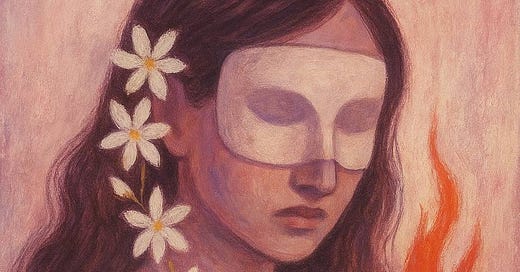They don’t tell you, at first, that being the bigger person comes with a cost.
They hand you the script—Be kind. Be gracious. Don’t react. Don’t raise your voice. Don’t sink to their level. Rise above. Forgive. Be nice.
Niceness. Sweetness. Silence.
Wrapped in jasmine and shame, dusted with jaggery, whispered into our ears like lullabies.
Be a good girl.
The first curse we ever learned to answer to.
When he cheats, you do not scream.
You do not become Kālī1 , arms bloodied, tongue dripping truth like venom.
No. You become Sita2.
Walking through fire, hoping to come out pure enough for them to believe you.
And even then, they question your purity.
Even then, they call your smoke hysteria.
When she lies about you, when she drags your name through the gutter and wears your ruin like a crown, you’re told to be the bigger person.
To not make a fuss.
Because girls support girls.
Even when they circle you not like sisters, but like sharks.
Even when they weaponise your softness, and sell your silence as proof of guilt.
You are told to love them anyway.
Because you are a girl.
And girls are supposed to be sugar and sandalwood and stitched smiles.
Soft hands. Tight fists. Open legs.
We’re taught that silence is maturity. That forgiveness is strength.
That women who speak out, who push back, who burn instead of bend—are bitter. Unlikable. Dangerous.
And god forbid you be dangerous.
You are to be fireproof, but never fiery.
You are to be powerful, but never loud.
Wanted, but never wanting.
Beautiful, but never dangerous.
You are to be angry, but only in private. With the door closed. In a language no one else understands.
And yet—inside you is a howl.
Not a whisper, a howl.
A scream born of centuries.
The scream of every girl who was told to say thank you for attention that felt like acid.
The scream your mother swallowed when her sacrifices were called duty.
The scream your grandmother swallowed when she wasn’t allowed to rage, to run.
Inside you lives a pantheon of betrayed women
You want to be wrath, not wisdom. But we weren’t taught that version.
We were taught to smile. To stretch ourselves into understanding. To carry the weight and never name it. To be palatable, agreeable, and always, always nice.
And god, hasn’t nice cost us enough?
Niceness is a muzzle. And muzzles do not protect you. They quiet you until you forget how to speak.
So let them call you difficult. Let them call you bitter. Let them call you unholy.
There are worse things.
There is being unheard.
There is being rewritten.
There is being so nice you disappear.
Kālī – In Hindu mythology, Kālī is the fierce goddess of destruction, transformation, and empowerment. Often depicted with a tongue dripping with blood and multiple arms wielding weapons, Kālī embodies the raw, unfiltered force of vengeance and truth, unlike the traditional roles of women expected to be passive or forgiving.
Sita – The central figure in the ancient Indian epic, the Ramayana, Sita is revered for her purity, devotion, and self-sacrifice. She undergoes a trial by fire to prove her chastity and remain the ideal of virtue. Her story, while symbolising resilience and moral strength, also speaks to the burdens of unchallenged suffering and the expectation for women to endure in silence.






I really enjoyed this. Relatable in so many ways and so deeply rooted in women's experiences. Well done.
Anjana, you’ve captured such a painful truth with clarity and strength. The quiet expectations placed on so many girls to be good, stay silent, and endure are deeply rooted, especially in Asian cultures. It’s heartbreaking how often silence is praised while pain is dismissed. Your words reflect a harsh reality and invite reflection and, hopefully, change. Thank you for giving voice to what so many have lived through but couldn’t say out loud.